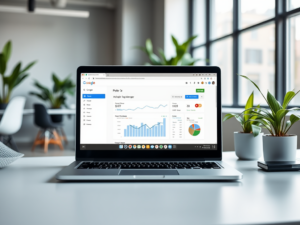
Optimizing meta tags is a crucial element in enhancing your website’s search visibility. By crafting effective meta titles and descriptions, you’ll help search engines understand your content better, potentially leading to improved rankings and increased click-through rates. This article explores the best practices for optimizing meta tags, guiding you on how to strategically implement them to boost your site’s SEO performance.
Understanding the Importance of Meta Tags

Meta tags are snippets of text that describe a page’s content and are vital for SEO. They don’t appear on the page itself but in the page’s code. While not a direct ranking factor, meta tags significantly influence user’s click-through rate from search engine results pages (SERPs), making them essential for on-page SEO. The primary types of meta tags include the meta title, meta description, and meta keywords, though the latter has lost its significance over time.
Understanding the language of search engines, meta tags act as a bridge between your content and search engine algorithms. They help dictate how your page is presented in search results, offering a brief summary to potential visitors that can affect their decision to visit your site. Thus, optimizing these tags is crucial not only for SEO but for improving user engagement with your search results.
Creating Effective Meta Titles

Meta titles are one of the most critical components of SEO meta tags. They appear as the clickable headline in search results and should concisely and accurately represent the content of your page. A well-crafted meta title not only attracts users but can also boost your SERP rankings. Here are some tips for optimizing your meta titles:
- Keep it concise, ideally under 60 characters to avoid truncation.
- Incorporate your primary keyword towards the beginning.
- Ensure it is unique for each page to prevent SEO cannibalization.
- Make it compelling to encourage clicks by maintaining a balance between keyword usage and readability.
- Reflect the page content accurately to meet user expectations and prevent bounce rates.
By following these guidelines, you’ll craft meta titles that not only communicate effectively to search engines but also appeal to the human aspect of digital searching, thus enhancing both visibility and click-through rates.
Writing Compelling Meta Descriptions
Meta descriptions provide a brief summary of your page’s content in search results. While they don’t directly impact SERP rankings, meta descriptions can seriously influence click-through rates. To optimize them effectively, consider these best practices:
- Keep it under 160 characters to ensure the full description is visible.
- Use actionable language to entice users to click.
- Include primary and secondary keywords naturally without keyword stuffing.
- Provide a clear, concise description that reflects what users will find upon visiting the page.
- Consider including a call-to-action to increase engagement, such as “Learn more” or “Find out how.”
By focusing on the user experience and the intent behind search queries, your meta descriptions can serve as a persuasive element that drives traffic to your site, encouraging interactions that support your SEO goals.
While meta titles and descriptions form the crux of meta tags for SEO, additional tags can also bolster your webpage’s search engine appeal. This includes Robots meta tags, which guide search engine behavior on your site, and Open Graph tags for social media optimization. Both impact how your content is viewed beyond simple search results. While implementing them, focus on:
- Using Robots tags to instruct search engines on which pages to index or not index.
- Employing Open Graph tags to optimize how your pages appear on social media platforms.
By incorporating these elements, you enhance your control over your site’s search presence and social media display, maximizing your outreach and connectivity with a broader audience.
Monitoring and Adjusting Meta Tags
Once you’ve optimized your meta tags, monitoring their performance and making necessary adjustments is key to maintaining and improving your SEO effectiveness. Utilize tools like Google Analytics and Search Console to track click-through rates and other engagement metrics associated with your meta tags.
Assess whether your meta titles and descriptions are performing by analyzing metrics such as bounce rates and page dwell time. High bounce rates may indicate that your meta tags are misleading or do not align with the page content. Regularly updating meta tags based on performance insights helps keep your SEO strategy agile and responsive to changing trends and user expectations.
Conclusion
Optimizing meta tags is an integral part of SEO that can greatly influence your site’s visibility and user engagement through search engines. By strategically crafting meta titles and descriptions, while considering additional tags like Robots and Open Graph, you’ll significantly enhance your website’s appeal to both search engines and users. With regular analysis and adjustments, your meta tags can continue to drive traffic and improve your overall digital presence.
Frequently Asked Questions
- What are meta tags?
Meta tags are snippets of code that provide information about a webpage to search engines and website visitors. They influence how search engines view and list the page in search results. - Do meta tags directly affect SEO rankings?
Meta tags themselves don’t directly affect SEO rankings, but they greatly influence click-through rates from search engine results, which can indirectly boost SEO performance. - How often should I update my meta tags?
Regular updates are recommended, particularly when the content of a page changes or to improve performance based on analytics insights. - Are meta keywords still relevant?
No, meta keywords have largely become obsolete as search engines now focus more on the context and content within the page itself. - Can I use the same meta tags for every page?
No, each page should have unique meta tags to accurately reflect its individual content and optimize search engine visibility.










